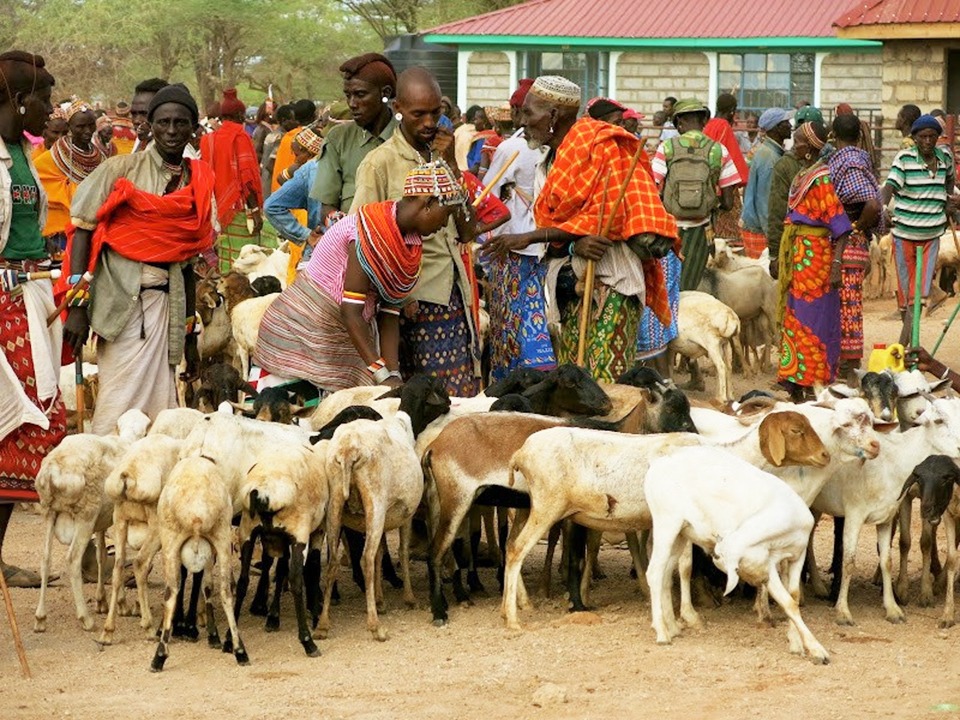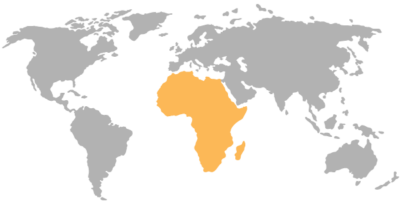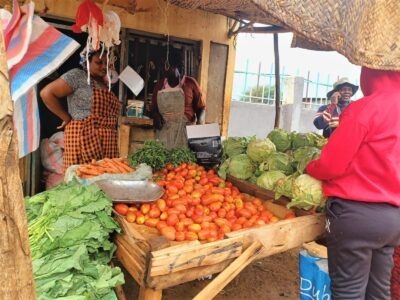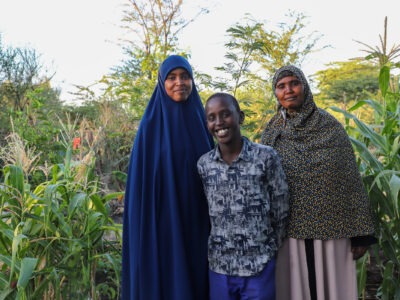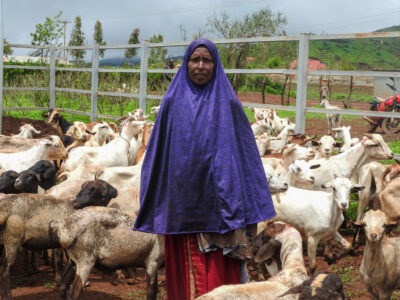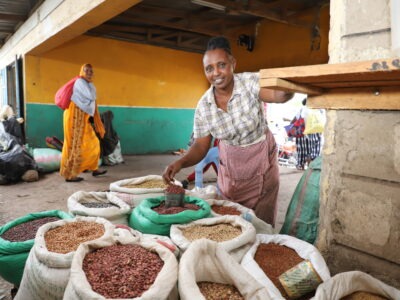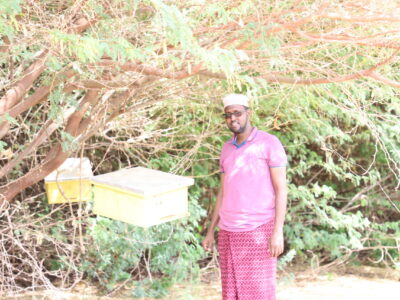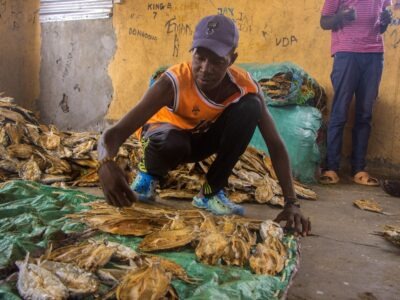Livestock Markets Building Resilience in Arid Lands
Background Narrative
The Feed the Future Kenya Livestock Market Systems (LMS) activity is funded by USAID, the U.S. government’s development aid agency, and implemented by ACDI/VOCA – a global leader with proven expertise in agriculture, economic growth, resilience, finance, equity, and inclusion. The activity’s goal is to improve people’s resilience – their ability to cope with stresses and shocks – while reducing poverty, hunger, and chronic undernutrition in six counties in northern Kenya – Garissa, Isiolo, Marsabit, Samburu, Turkana, and Wajir. LMS prioritizes collaboration with county governments and leverages the private sector to expand and sustain impact.
Project Objectives
- Expand and diversify viable economic opportunities through hard and soft investments.
- Strengthen institutions, systems, and governance to support the development and competitiveness of livestock and other market systems and successfully manage their natural resources, especially rangeland and water access and availability–two key aspects of pastoral livelihoods.
- Collaborate action and learning for market systems change under direction from the leader award.
- Improve human capital to help individuals become more resilient and prepared for economic engagement.
Project Activities & Approaches
Activities 2022-2024
From October 2022 to June 2024, USAID LMS is assisting communities in northern Kenya in coping with the devastating effects of drought, the coronavirus pandemic, and the war in Ukraine. The interventions are assisting communities to save their development gains and to protect livelihoods.
Promoting Access to Water, Sanitation, and Hygiene
USAID LMS is working closely with county governments and ward planning committees in the six activity counties to rehabilitate 47 community water projects and provide sustainable access to clean drinking water to 69,108 people (11,518 households) and their livestock out of a target of 121,020 people (20,170 households). The interventions include the repair of damaged borehole components, installing new pipelines and solar-power systems, as well as refurbishing or constructing water kiosks. To sustain water management, USAID LMS trained water users’ associations (WUAs) on critical topics such as water resource management, community engagement, environmental considerations, gender and social inclusion, and financial management.
Boosting Food Availability for Vulnerable Households
USAID LMS provided access to food and non-food items to over 300,000 people through support to small-scale food and livestock traders, the re-establishment of collapsed markets, the supply of livestock feed to milking animals, and linking households to agrovets. The activity operationalized 45 markets for the continued sale of livestock, food, and non-food items. LMS also supported 3,373 out of a target of 5,755 small-scale food and livestock traders with cash transfers, to boost access to food commodities and keep businesses afloat. Additionally, 6,712 households out of a target 10,350 benefited from nutrient-dense livestock feeds, saving 152,860 livestock valued at $4.7 million from drought-related deaths. LMS further connected the households to 32 agro-veterinary suppliers for continuous feed supply.
Building Community Capacities
LMS strengthens the roles and interactions of various actors within local systems, such as ward planning committees (WPCs), water users’ associations, livestock market associations, and Girls Improving Resilience through Livelihoods (GIRL). Through the localization approach, we aim to empower marginalized and underrepresented groups by developing their capacities and providing them with the necessary skills and opportunities to lead their growth. LMS also increased funding flows by providing in-kind grants to county governments, SMEs, and chambers of commerce. The goal is to ensure that the solutions implemented are owned by the local community and sustainable even after the activity’s completion.
Activities 2017-2022
Strengthening Livestock Markets
USAID in collaboration with county governments built 20 livestock markets in northern Kenya to boost trade and income for pastoralist families. To improve market management, USAID LMS trained Livestock Marketing Associations (LMAs) on important aspects like leadership, marketing, record keeping, and inclusivity. More importantly, USAID LMS actively advocated for the enactment of market-friendly laws to create a supportive environment for trade. As a result of USAID’s initiatives, 78,617 households recorded increased annual income from an average of $1,000 to $1,400.
Strengthening Key Business Institutions
USAID LMS played a key role in the growth of key institutions like cooperatives (producer, savings, and credit), Chamber of Commerce and Industry chapters, and ward planning committees, Small and Medium-Sized Enterprises (SMEs) by enhancing their access to resources and networks. Through investments in value addition of livestock products – milk and meat, USAID LMS assisted entrepreneurs in the livestock sector to expand their businesses. The activity also diversified economic opportunities to improve livelihoods and reduce pressure on rangelands. USAID has strengthened 50 cooperatives that were targeted with training and equipment and supported the management procedures for 38 cooperatives in the six activity counties.
Supporting County Governments Legislative Processes
USAID LMS governance and policy work aims to create sustainable, inclusive development in northern Kenya. We work towards equitable allocation of resources that promotes peace and food security. USAID LMS collaborates with other partners to create an enabling environment for communities to access environmental, social, and economic opportunities within the market systems, to reduce poverty and enhance community resilience. We support counties in developing social protection, gender, and youth policies. These aim to reduce gender disparities in access to, control over, and benefit from resources, wealth, opportunities, and services – economic, social, political, and cultural.
Project Results
Between 2017 and 2022, through USAID LMS support:
- 2,600 diversified businesses strengthened
- 17,000 girls transitioned out of poverty into sustainable and resilient livelihoods with 1,000 girls back in school
- 19,982 women and 8,971 youth participating in various activities within 19 livestock markets
- 334 grantees (216 women and 118 youths) actively engaged in market development, business expansion, job creation, livelihood opportunities, and access to markets
- 33 Ward Planning and Development Committees out of an initial target of 24 leading development initiatives in their communities
Between 2022 and 2024, through USAID LMS support:
- 11,518 households (69,108 people) out of a target of 20,170, accessing water for household and productive use
- 3,373 out of 5,755 small-scale traders with a 25 percent increased income, serving a population exceeding 300,000 people.
- 6,712 households out of a target 10,350 benefited from nutrient-dense livestock feeds, saving 152,860 livestock valued at $4.7 million from drought-related deaths.
- 77 institutions strengthened in management and operations -cooperatives (producer, savings, and credit), Chamber of Commerce and Industry chapters, and ward planning committees.
- Over $2 million was channeled to support 73 micro, small, and medium-sized enterprises (MSMEs), aiding low-income families in diversifying their livelihoods, building resilience, and increasing their income.
Grants Categories
The grant facility of the Kenya Livestock Market Systems Activity funded by the United States Agency for International Development (USAID) is aimed at addressing market systems constraints, and incentivizing innovation for market systems change in Northern Kenya.
There are four grant categories under the facility:
- Small grants: a) for start-up or expansion of micro-enterprises or businesses—targeting small traders and those that supply to larger entrepreneurs; b) to support various activities for improving resilience—targeting GIRL and REAP groups; and c) to enhance youth employability and workforce development—targeting youth 18-35 years
- Medium grants: a) to support new technologies and models, e.g. for water and rangeland management, conflict resolution, nutrition advancement, etc.—targeting community-level institutions; and b) matching grants to support community priorities—targeting Ward Planning Committees and/or community-level institutions
- Growth grants: a) to buy down risk and cost of entry for businesses; and linking enterprises to larger businesses—targeting businesses that have graduated from the small grants category; and b) to support established businesses, e.g. in fodder production, value addition, processing, input supply, etc.—targeting established businesses
- Innovation grants: a) to support new and innovative solutions to old problems—targeting enterprises, women and girls, youth, community-level and other institutions
Resources
View the project’s brochure here.
View the project’s FY2021 Progress Report here.
Project Leadership
Chief of Party: Joe Sanders
jsanders@acdivoca.org
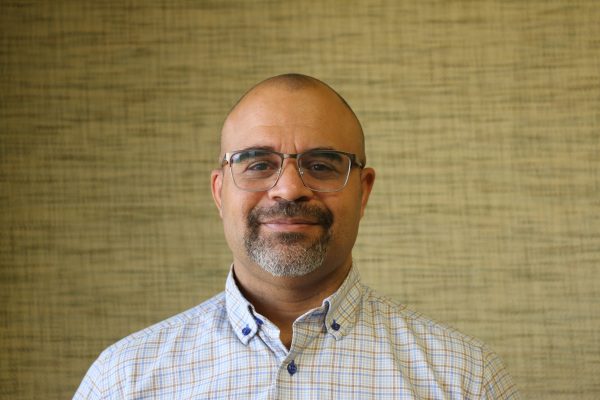
Project Director: Mike Thayer
mthayer@acdivoca.org
Associate Manager: Elbridge Boardman
eboardman@acdivoca.org

